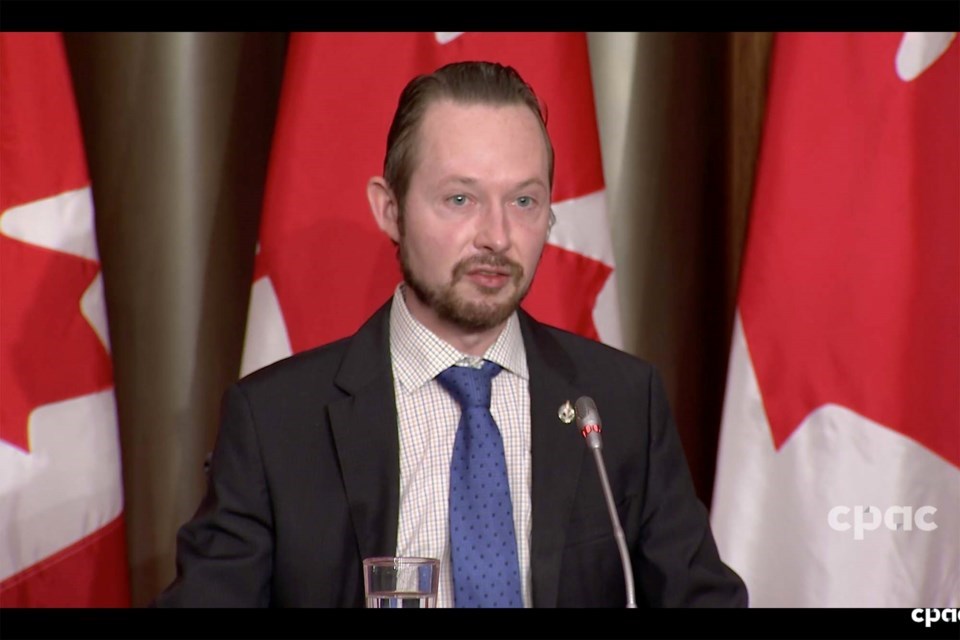The federal budget introduced this week brought in measures to battle the COVID-era recession and inflation, however St. Albert MP Michael Cooper said the budget was a disappointment.
“It continues (Prime Minister) Justin Trudeau’s record of higher taxes and inflationary deficits,” Cooper said.
The 2023 federal budget laid out Tuesday in Ottawa moves ahead in the recovery from the COVID-era recession, leading with measures for everyone from grocery buyers, credit card users and home buyers, to students.
“What was announced was a massive increase in spending, a $43 billion spending bonanza. It means more debt and more inflation, which is going to hit everyday Canadians in the wallet,” he said in the hours following the budget’s delivery.
“What this budget is an attack on everyday Canadians … More inflation, more costs, and more taxes,” he said. “For ordinary Canadians, there’s no relief in this budget, when Canadians are facing a cost of living crisis.”
Cooper blamed Liberal government spending for inflation rates reaching a 40-year high.
“At the very least, the government shouldn’t have increased taxes. There’s another increase in the carbon tax, on top of a payroll tax hike,” he said.
“Look at some of the measures that are supposed to help everyday Canadians, such as a grocery rebate that will give a single adult $234 dollars, but that’s offset by a carbon tax hike and payroll taxes,” Cooper said.
A new one-time Grocery Rebate will run the government $2.5 billion, offering inflation relief for 11 million Canadians most in need. That’s a one-time $467 for eligible couples with children; an extra $234 for single Canadians without children; and an extra $225 for seniors, on average.
With food increases as a result of inflation, the average family will spend up to $1,000 more a year on food this year, Cooper said.
“Everyday Canadians are going to pay more, not less. There are no savings in this budget for everyday Canadians,” Cooper said, adding that the Liberal government has no plan to balance the budget.
The local MP said debt servicing costs have actually doubled in the last two years
“In the fall they predicted a $4 billion surplus in 2027. Now they’re predicting a $14 billion deficit for 2027,” Cooper said.
“Higher taxes, what that’s this is going to mean for everyday Canadians,” Cooper said.
Budget details
Deputy Prime Minister Chrystia Freeland touted the budget’s support for a stronger middle class, an affordable economy, and a healthy future for Canadians.
The budget sustains the lowest deficit and the lowest net debt-to-GDP ratio in the G7, Freeland said, noting that inflation in Canada has fallen for eight months in a row and unemployment is near record lows.
Canada’s universal public health care system gets a budgetary boost with $198.3 billion to reduce backlogs and expand access to family health services.
Other relief measures for average Canadians include working with regulatory agencies, provinces, and territories to take aim at hidden junk fees and predatory lending.
Payday lenders will have their wings clipped as the government cracks down on predatory lending by proposing to lower the “criminal rate of interest.”
The current criminal rate of interest under the Criminal Code, equivalent to 47 per cent APR (annual percentage rate), can trap Canadians in a cycle of debt. The government plans to adjust the Criminal Code's payday lending exemption to require payday lenders to charge no more than $14 per $100 borrowed.
New policy direction to the Canadian Radio-television and Telecommunications Commission so Canadians can affordably and easily change, downgrade, or cancel services.
Government-secured commitments from Visa and Mastercard will lower fees for small businesses, saving eligible small businesses approximately $1 billion over five years.
Small electronics owners will dig a digital promise to a “right to repair” home appliances and electronics in 2024, including a standard charging port that would lower costs and reduce electronic waste.
Travellers stranded in airports may find more support for their claims as the government proposes amending the Canada Transportation Act to strengthen airline obligations to compensate passengers for delays and cancellations. The budget also addresses “excessive” baggage fees.
The budget includes permanently eliminates interest on Canada Student Loans and Canada Apprentice Loans, changes to loan repayment assistance so that nobody earning less than $40,000 per year needs to make payments on their federal student loans.
Other measures for students include increasing Canada Student Grants by 40 per cent for up to $4,200 for full-time students, raising the interest-free Canada Student Loan limit from to $300 per week of study, and waiving credit screening for mature students to qualify for federal student grants and loans for the first time.
Up to $14,400 in enhanced Canada Student Financial Assistance for the coming school year, and students with disabilities and students with dependents will receive an increase in Canada Student Grants.
Additional measures help part-time students with dependents, and provide up to $20,000 per year to aid students with persistent, prolonged, or permanent disabilities afford services and equipment for studies.
The budget calls for additional measures to increase skilled trade workers, expand training and innovation programs, and support employee ownership trusts.
A new Tax-Free First Home Savings Account on April 1, 2023 will help Canadians become home owners.




